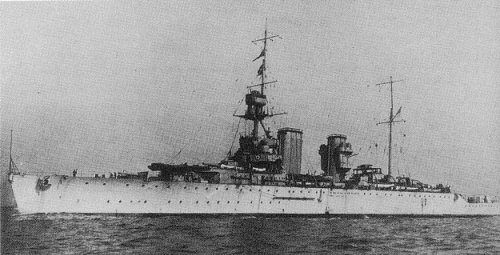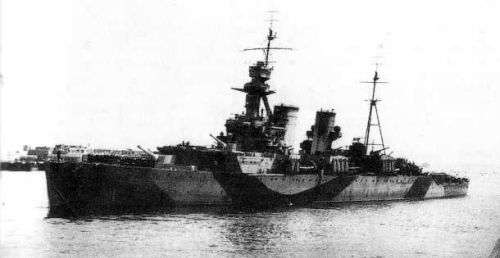

Frobisher 1924

Effingham 1940

Frobisher 1942

Frobisher 1943
| Name | No | Yard No | Builder | Laid down | Launched | Comp | Fate |
| Hawkins | D86 | Chatham DYd | 3.6.1916 | 1.10.1917 | 7.1919 | sold for BU 8.1947 | |
| Raleigh | 551 | Beardmore, Dalmuir | 4.10.1916 | 28.8.1919 | 7/1921 | wrecked 8.8.1922 | |
| Frobisher | D81, 1948- C81 | Devonport DYd | 2.8.1916 | 20.3.1920 | 9.1924 | sold for BU 3.1949 | |
| Effingham | D98 | Portsmouth DYd | 2.4.1917 | 8.6.1921 | 7.1925 | wrecked 17.5.1940 |
|
Displacement normal, t |
9750 |
|
Displacement full, t |
12110 - 12300 |
|
Length, m |
184.4 |
|
Breadth, m |
19.8 |
|
Draught, m |
5.9 |
|
No of shafts |
4 |
|
Machinery |
Hawkins: 4 sets Parsons geared steam turbines, 12 Yarrow boilers Raleigh: 4 sets Brown-Curtis geared steam turbines, 12 Yarrow boilers Effingham, Frobisher: 4 sets Brown-Curtis geared steam turbines, 10 Yarrow boilers |
|
Power, h. p. |
Hawkins: 60000 Raleigh: 70000 Effingham, Frobisher: 65000 |
|
Max speed, kts |
Hawkins: 30 Raleigh: 31 Effingham, Frobisher: 30.5 |
|
Fuel, t |
Hawkins, Raleigh: oil 1480 + coal 860 Frobisher, Effingham: oil 2150 |
|
Endurance, nm(kts) |
Hawkins, Raleigh: 5400(14) Effingham, Frobisher: 7000(15) |
|
Armour, mm |
belt: 76 - 38, deck: 38 - 25, bulkheads: 25, gun houses: 51, magazines: 25, CT: 76 |
|
Armament |
Hawkins: 7 x 1 - 190/45 BL Mk VI, 6 x 1 - 76/50 12pdr 18cwt QF Mk I, 4 x 1 - 76/45 20cwt QF Mk I, 4 x 1 - 47/40 3pdr Hotchkiss Mk I, 2 x 1 - 40/39 QF Mk II, 6 - 533 TT (beam) Raleigh: 7 x 1 - 190/45 BL Mk VI, 4 x 1 - 76/45 20cwt QF Mk I, 2 x 1 - 40/39 QF Mk II, 6 - 533 TT (beam) Frobisher, Effingham: 7 x 1 - 190/45 BL Mk VI, 3 x 1 - 102/45 QF Mk V, 2 x 1 - 40/39 QF Mk II, 6 - 533 TT (beam) |
|
Complement |
712 |
Project history: A new class of cruisers was
designed in 1915 to meet the threat of armed raiders in distant oceans, for the
effort to hunt down the small number of German cruisers in August-December 1914
had seriously depleted the Grand Fleet's light cruiser squadrons and had
disrupted movements of troopships. In June 1915 the Admiralty asked the DNC to
prepare designs for an improved Birmingham with heavier armament, higher
speed and more endurance. DNC's proposals were for a 9000t hull with a variety
of armaments: 8, 12 or 14 152mm or a mixed armament of 2 234mm and 8 152mm. Two
234mm were felt to offer poor chances of hitting at long distance, while the
152mm would be outranged, so a uniform armament of 190mm was chosen, firing a
91kg shell.
To assist operations in distant areas it was decided to make
the four boilers in the after boiler room suitable for mixed coal-/oil-firing,
while the old practice of using coal bunkers as protection was revived. The
decision was made in 1917 to modify the boilers and turbines to boost power to
70000shp, but not in Cavendish and Hawkins because they were too
advanced. As things turned out Raleigh was the only one to have the
higher performance as Effingham and Frobisher were altered to burn
oil fuel only. Their mixed-firing boilers were replaced by 2 standard Yarrow
small-tube boilers as in the forward boiler rooms, and power was increased to
65000shp. In 1929 Hawkins was brought up to the same standard, with only
8 oil-fired boilers, but power boosted so that total power was only reduced to
55000shp and more endurance was provided.
Although referred to as 'Improved Birmingham' the
ships bore no resemblance to the 'Town' class, apart from having a long
forecastle. The hull was based on the Furious, with sides sloped inboard
at 10°, and 1.5m 'bulges' covering the machinery spaces. The magazines were
given 'box' protection, with 25mm crowns and 25mm sides, a light and economical
form of internal armouring which was used in all later cruisers. With 7.6m
freeboard forward they were fine seaboats. The 190mm BL Mk.VI was based on the
old Mk.I in the Devonshire class, but given 30° elevation, allowing
shooting out to 20.000m. In 1918 electrical training and elevation was provided
but it remained a cumbersome mounting, with hand-loading for an extremely heavy
shell. At the end of 1917 the Cavendish was earmarked for completion as
an aircraft carrier, and she was renamed Vindictive in June 1918 to
commemorate the old cruiser used as a block-ship in the raids on Zeebrugge and
Ostend. The Hawkins was completed with reasonable promptness but
Effingham and Frobisher were given very low priority after the
Armistice, being dockyard contracts.
According to decisions of the 1930 London Conference cruisers of this class had to been disarmed by 1936 as exceeding a limit to British heavy cruisers. In the mid-thirties Vindictive was converted to TS, and three remaining ships were laid up, having their 190mm guns landed. It has been solved to rearm them with 152mm guns to leave them at service. Effingham received 152mm guns in 1937-1939. In 1939 it was planed to put Hawkins for conversion. Hawkins and Frobisher received their old guns when the war begun and entered service in January, 1940 and March, 1942 respectively.
Ship protection: Underwater protection (bulges) was 1.5m in deep. Main belt was 76mm thick abreast machinery and extended up to upper deck. Its thickness decreased consistently to 64-51-38mm fore and 64-57mm aft. Upper 51mm belt extended from "A" turret to forecastle cut and from main belt to forecastle deck. Flat main deck connected with upper edge of main belt and was 38mm over machinery, 25mm over steering gear and 13mm above other parts. Magazines had additional separate protection with 13mm sides and 25mm crowns.
Modernizations: 1921, Hawkins: - 6 x 1 - 76/50
1924, Hawkins: - 4 x 1 - 76/45; + 2 x 1 - 102/45 QF Mk V
1928, Frobisher: + 1 x 1 - 102/45 QF Mk V, 1 catapult, 1 seaplane
11/1929, Hawkins: 4 boilers were removed, rest boilers converted to fuel oil only. Maximal fuel stowage was 2740t of oil, maximal engine power was 55.000hp and maximal speed was 29.5kts; + 2 x 1 - 102/45 QF Mk V
1932, Frobisher: converted to TS; - 2 x 1 - 190/45, 4 - 533 TT (aw)
1936 - 1937, Hawkins, Effingham, Frobisher: all 190/45 guns and aw TT removed.
6/1938, Effingham: 2 boilers were removed, rest boilers trunked into one funnel, fuel stowage raised to 2620t, engine power decreased to 58.000hp, maximal speed was 29.5kts; - 4 x 1 - 47/40, 2 - 533 TT (sw); + 9 x 1 - 152/45 BL Mk XII, 1 x 1 - 102/45 QF Mk V, 3 x 4 - 12.7/62, 4 - 533 TT (aw, beam)
early 1939, Effingham: - 4 x 1 - 102/45; + 4 x 2 - 102/45 QF Mk XVI, 2 x 8 - 40/39 2pdr QF Mk VIII, 1 catapult, 1 seaplane; full displacement was 12514t.
1/1940, Hawkins: - 4 x 1 - 47/40; + 7 x 1 - 190/45 BL Mk VI, 2 x 1 - 40/39 2pdr QF Mk VIII, 4 - 533 TT (aw, beam)
12/1941, Hawkins: + type 271, type 285 radars
3/1942, Frobisher: - 4 x 1 - 47/40, 2 x 1 - 40/39; + 5 x 1 - 190/45 BL Mk VI, 1 x 1 - 102/45 QF Mk V, 4 x 4 - 40/39 2pdr QF Mk VIII, 7 x 1 - 20/70 Oerlikon Mk II/IV, 4 - 533 TT (aw, beam), type 271, type 281, type 285 radars
5/1942, Hawkins: - 2 x 1 - 40/39; + 2 x 4 - 40/39 2pdr QF Mk VIII, 7 x 1 - 20/70 Oerlikon Mk II/IV
1943, Frobisher: + type 282 radar
12/1943, Hawkins, Frobisher: - 4 - 533 TT (aw, beam)
5/1944, Frobisher: + 12 x 1 - 20/70 Oerlikon Mk II/IV, type 650 ECM suite
8/1944, Hawkins: - 2 x 4 - 40/39, 2 x 1 - 40/39; + 2 x 8 - 40/39 2pdr QF Mk VIII, 3 x 1 - 20/70 Oerlikon Mk II/IV; full displacement was 13160t.
10/1944, Frobisher: - 2 x 1 - 190/45, 4 x 1 - 102/45, 6 x 1 - 20/70
1.1946, Hawkins: 7 x 1 - 190/45 CP Mk V, 4 x 1 - 102/45 HA Mk III, 2 x 8 - 40/39 Mk VIA, 10 x 1 - 20/70 Mk III, 2 - 533 TT (beam), type 271, type 285 radars
1.1946, Frobisher: 3 x 1 - 190/45 CP Mk V, 1 x 1 - 102/45 HA Mk III, 4 x 4 - 40/39 Mk VII, 13 x 1 - 20/70 Mk III, 2 - 533 TT (beam), 1 catapult, 1 seaplane, type 271, type 281, type 282, type 285 radars, type 650 ECM suite
Naval service: Raleigh ran aground in thick fog near Labrador and later abandoned. Effingham 18.5.1940 ran to uncharted rock in West-fjord (Norway), her wreck has been blown up 3 days later. Frobisher was damaged by a torpedo 9.8.1944 and was 2 months under repair.

Hawkins 1922

Frobisher 1944
Many thanks to Wolfgang Stöhr for additional information on this page.
© Ivan Gogin, 2008-15